SACU Medical
Improving the quality of life of the most vulnerable
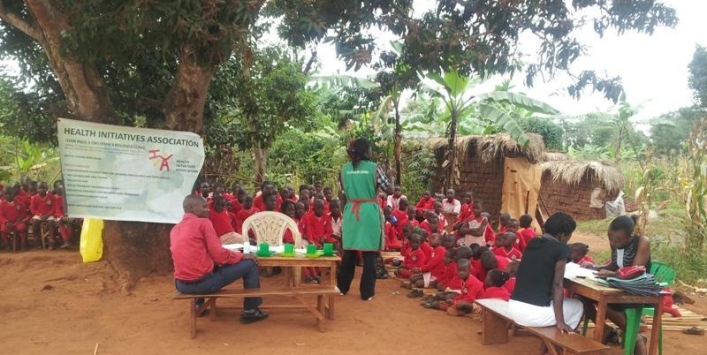
In February 2018, all SACU registered children received a mosquito net which will help reduce the spread of malaria in the community.
During routine monitoring, it was found that some of the nets were being used by the grandparents as they had none. They know that if they get malaria, the children would not be able to take care of them or themselves. If the grandparent dies, the children would be left alone.
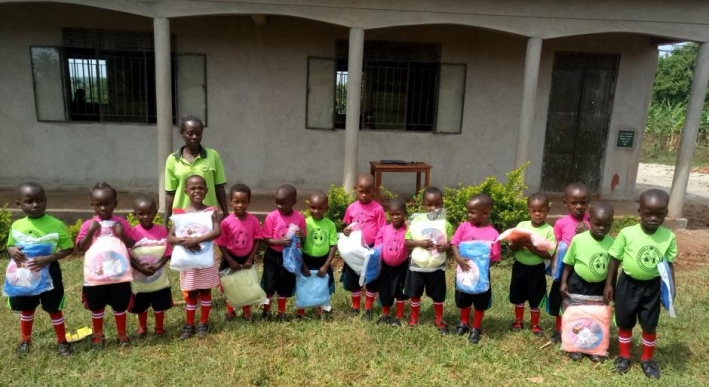
All children were screened for diabetics & HIV/Aids, fortunately no new cases were evident. The children that are affected by HIV/AIDS are given special attention by the Health Initiatives Association, our health partners in Buwundo. The medical team will also give deworming tablets to all our children.
Food supplements to infected orphans and vulnerable children
When SACU first started, the children were sick with malaria, cough & cold symptoms and general ill health.
Nsubuga Jackson in baby class is a 4 year old boy with some physical & intellectual challenges. When he was one, he had malaria which resulted in weak physical & intellectual abilities.
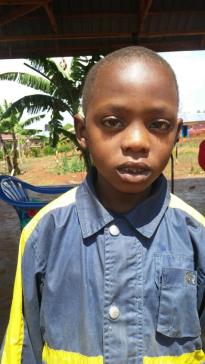
Despite the various efforts by the project, malaria still remains a threat to the Buwundo community. Everyone is at risk of getting malaria, especially children under five years, pregnant women and people living with HIV/AIDS as their immune system have not yet developed or are reduced by living conditions.
Malaria has also a direct impact on the school. Not only does it result in loss of life and loss of productivity, but it also hampers children’s schooling and social development through absenteeism and/or permanent neurological or other damages associated with severe episodes of malaria.
Malaria requires urgent medical attention within 24 hours of the onset of signs if fatalities are to be avoided. Most people are aware of the signs such as high temperature but as a result of poverty, guardians of these kids cannot pay for the urgently needed medical attention and as a result they resort to herbs.
The project has taken a holistic approach in addressing the epidemic through:
- Offering free medical attention to our sick children
- Distribution of mosquito nets to our children
- There are Malaria awareness campaigns in the community through music and drama during concert days and parent meeting.
- The staff of SACU also do their best to monitor that the nets are being used by the children.
Statistical analysis of disease at SACU this term
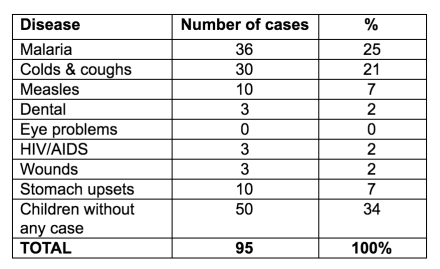
In addition to the general lunch and breakfast received at the SACU, the program intends to offer orphans and vulnerable children infected with HIV/AIDS food supplements which are recommended by health personnel. This will reduce the burden on caregivers who are mostly the aging population and improve the health of the children. This program needs financial support. We believe that food is medicine.
The loss of a parent to AIDS has had serious consequences for a child’s access to basic necessities such as shelter, food, clothing, health and education. Orphans are more likely than non-orphans to live in large, female-headed households where more people are dependent on fewer income earners. This lack of income puts extra pressure on AIDS orphans to contribute financially to the household, in most cases these children engage in commercial labor in the village where they are exploited, go begging or seeking food and at times sleep without food. Some are used as house maids responsible for cooking, fetching water, washing, working in sambas etc.
Responding to this, SACU offers a simple lunch and breakfast each day for the children and this has brought a smile on the faces of many. The program continues to face the challenge of feeding over 100 children, stretching the available resources and having to deal with price increases of the basics due to drought. We appreciate the donations for special monthly treats for the children which might be eggs or bananas, and the children love it.
Shelter Program – Home
Who is caring for these orphans?
As the epidemic of poor health in Africa takes its toll on adults, many children have come to rely on aging and often impoverished grandparents to care for them. Studies of population dynamics suggest that for the next generation of children, there will be far fewer grandparents to be caregivers. When there are no grandparents, older children are often left as head of household to care for their younger brothers and sisters.
The majority of these children are forced to fend for themselves. Young girls continue to bear the majority of the responsibility to care for their younger siblings who are often as young as five years old. This increased responsibility as well as the lack of financial resources has forced many girls to dropout of school in order to earn a simple living. Grandparents can provide a secure and loving environment but are often unable to respond to the child’s psychological, legal, economic, and basic needs. They are usually poor and receive little or no support from the community to help them shoulder their immense burdens.
The potential for these children to form a large group of dysfunctional adults, which could further destabilize a society already weakened by AIDS, has increased the urgency of finding an effective solution to the orphan crisis.
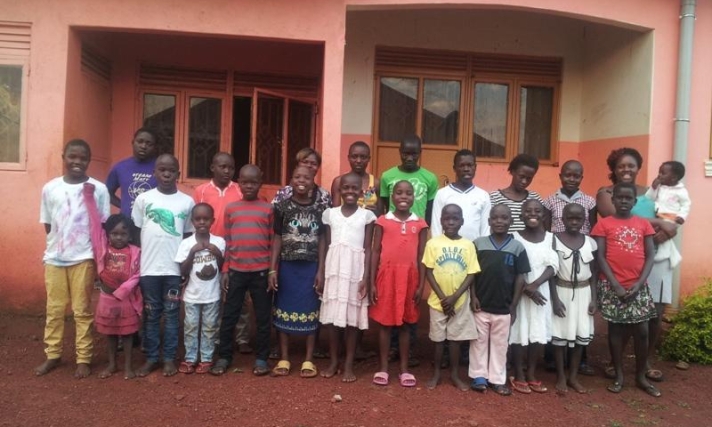
Even though Save African Child Uganda (SACU) has made progress, there is still a lot of work to be done. We should remember that the process of losing parents to HIV/AIDS for the children often includes the pain and the shame of the stigma and the fear that the disease carries in most our societies. These children do endure a challenging life in their village. Some do not want to leave the school at the end of the day due to severe conditions they face at home. This has challenged us and justified a genuine reason for the creation of a home for these children which we established in 2012.
This year, SACU and its partners have continued financing the shelter program where homeless children are accommodated 24 hours/7 days a week, from January to December to support & encourage them to develop emotionally, physically, intellectually and spiritually in a nurturing environment. Our goal, through study & hard work is that the children will be successful in securing a job and begin to start a new life on their own. We celebrate our first graduate Namiro Hasifah who is now a Head teacher at Kids Ark School in Kampala.
SACU will continue to work to improve the lives of the children who have lost hope, and to speak for those who are oppressed and marginalized.
SACU is grateful to all of its partners including donors, volunteers and those who sponsor children, for their support ensuring that the students may look forward to and dream of a meaningful life.
SACU SHELTER..A HOME FOR THE HOMELESS
“Establishing sustainable nurturing homes for vulnerable, homeless and orphaned children in the village of Buwundo so that the children may reach their full potential”
What makes a nurturing environment:
- Having very caring and friendly shelter staff
- Having well arranged, clean, self-contained shelter facilities, making it a second home
- An appealing & nutritious menu that includes rice, posho, matooke, Irish, sweet potatoes, cassava accompanied by beans, cowpeas, greens, beef, eggs and silverfish.
- Our home’s surroundings are surrounded by well-kept gardens.
- The weekend entertainment schedule provides movies, ball games and learning board games such as scrabble and chess
Generally SACU has given us the children a home.
In a loving, Christian environment SACU provides full care for the children, including accommodations, food, clothing, medical care, playtime equipment, and education. In order to cover the operating costs for these complete services, multiple sponsors are necessary for each child.
SACU children’s shelter provides 30 orphaned, vulnerable and abandoned children in Uganda, new hope for a better life.
SACU children’s shelter is located on the same site as the Nursery & Primary School making it convenient for the children to attend classes.
The grade levels include:
Baby class, children are 4 yrs old to start in the preschool
Middle class
Top class
P1-P7
all classes are held simultaneously for seven hours a day, six days per week.
SACU follows the Ugandan Ministry for Education curriculum with supplemental educational materials and subjects to enhance their intellectual growth. Instruction is in English, the official language of Uganda.
